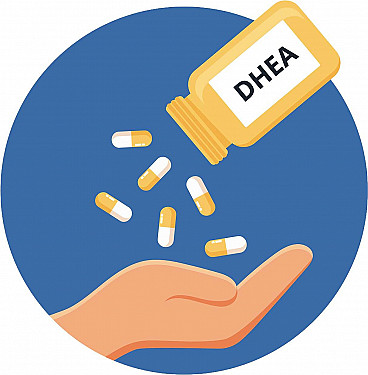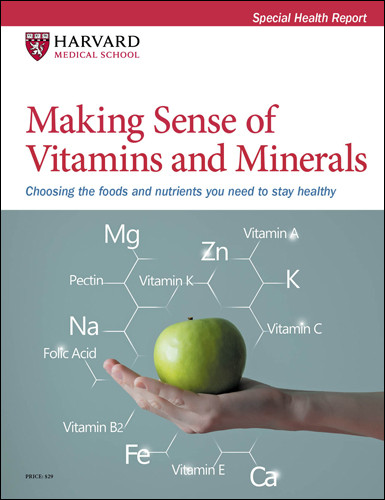Don't waste time (or money) on dietary supplements
Americans spend billions per year on these products, even though most people don't need them.

In 2022, Americans are projected to spend $35.6 billion on dietary supplements. That's a lot of money for products that show little, if any, evidence of benefits.
"The thinking is that taking these pills can somehow improve your health or protect you from disease," says Dr. Pieter Cohen, associate professor at Harvard Medical School and general internist at Harvard-affiliated Cambridge Health Alliance. "While some people may need specific vitamins or supplements to help with deficiencies, for the average healthy person, following a diet with plenty of fruits and vegetables provides all the essential vitamins and minerals."
A look at labels
"Dietary supplement" is an umbrella term. It includes everything from individual nutrients — vitamins A, B, C, D, E, and K and minerals like calcium — to multivitamins and specialized "senior" formulas that contain various combinations of vitamins, minerals, phytonutrients, and other compounds.
Why do people buy so many? Blame clever marketing and loopholes in federal guidelines. The FDA regulates dietary supplements as a subcategory of food but not as prescription or over-the-counter drugs. This means the FDA only monitors claims on supplement labels regarding disease treatment.
For instance, dietary supplements cannot make claims about treating specific conditions on their labels, like "lowers heart disease risk" or "protects against dementia." Yet, the guidelines do allow for phrases like "promotes heart health" or "supports immunity." (However, any such phrases must be followed by these words: "This statement has not been evaluated by the Food and Drug Administration. This product is not intended to diagnose, treat, cure, or prevent any disease.")
"This kind of ambiguity means the sky's the limit in terms of how manufacturers can present their products," says Dr. Cohen. "And many people don't realize the difference. They see 'heart health' and think it's beneficial even though there may not be anything in the product that has shown effectiveness."
The medical consensus is that there are no miracles in those bottles. Multiple studies have found that taking extra vitamins and minerals doesn't protect against disease or improve overall health in otherwise healthy people.
But what about taking extra vitamins known to be helpful? For instance, vitamin C is loaded with antioxidants shown to support the immune system. So, why not load up on vitamin C pills to, say, fight a cold? In general, taking large amounts of vitamin C is not toxic since the body can only absorb so much, and any excess gets excreted in urine. "But again, there is no proof that taking extra vitamin C beyond the recommended 90 milligrams per day for adult men offers extra protection from infections," says Dr. Cohen.
Some vitamins or minerals can cause health problems when taken in high amounts. For example, high calcium intake has been linked to an increased risk of prostate cancer. Taking a lot of vitamin A — a fat-soluble vitamin that can build up in the body, which stores what it doesn't use — can cause dizziness, nausea, headaches, and in rare cases, even death.
What's the problem with a daily multivitamin?Healthy adults don't need dietary supplements, but what if you don't eat right all the time? Should you pop a daily multivitamin for good measure? Doctors have different opinions about multivitamins. Some take a "might-help-won't-hurt" approach to fill in nutritional gaps in one's diet. Others believe they are not necessary. If you feel you need a multivitamin, there is no harm in taking one. "Studies have shown that taking multivitamins as prescribed usually doesn't cause serious issues," says Dr. Pieter Cohen, general internist at Harvard-affiliated Cambridge Health Alliance. But realize that multivitamins have their limits. "They might offer extra vitamins and minerals you may occasionally lack from your regular diet, but they are not a replacement for healthy eating, and they won't offer special benefits or protection," says Dr. Cohen. |
Who needs a supplement?
While a well-balanced diet usually provides sufficient amounts of micronutrients, special attention should be given to vitamins D, B12, and B6.
Strict vegans may not get enough vitamin B12 from food and usually need a B12 supplement. Vitamin B12 deficiency can result from reduced stomach acid production caused by aging or by regularly taking proton-pump inhibitors or H2 blockers to manage heartburn or gastroesophageal reflux disease. Without enough stomach acid, it's harder for the body to absorb vitamin B12 from food. Low levels of both B12 and B6 also can stem from digestive disorders, such as Crohn's disease, celiac disease, and ulcerative colitis, as well as from procedures like gastric bypass surgery.
Vitamin D insufficiency is especially common in older adults. Few foods are naturally high in the vitamin, and getting enough sunlight for the skin to convert to vitamin D can be challenging, even in the summer. A daily 1,000-IU vitamin D supplement offers safe insurance. "A blood test can identify most deficiencies, and your doctor may then prescribe an individual vitamin or multivitamin to help increase levels," says Dr. Cohen.
Image: © wildpixel/Getty Images
About the Author

Matthew Solan, Former Executive Editor, Harvard Men's Health Watch
Disclaimer:
As a service to our readers, Harvard Health Publishing provides access to our library of archived content. Please note the date of last review or update on all articles.
No content on this site, regardless of date, should ever be used as a substitute for direct medical advice from your doctor or other qualified clinician.
















